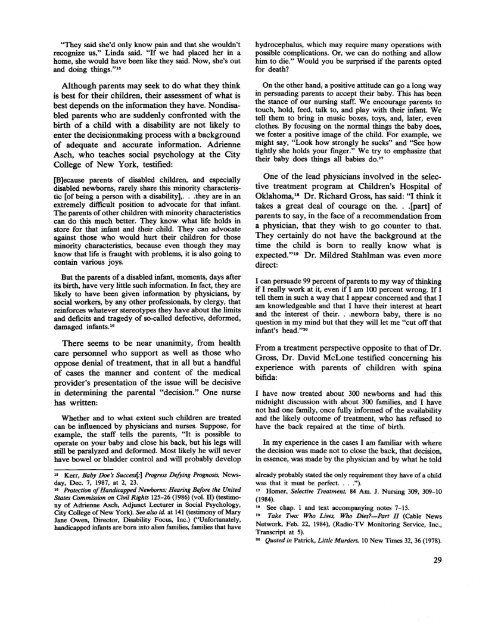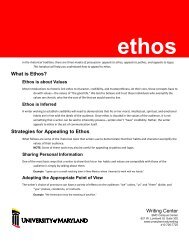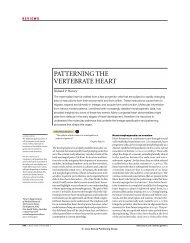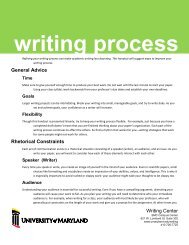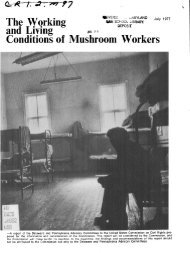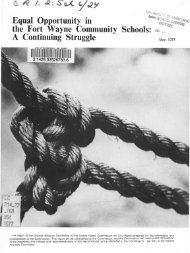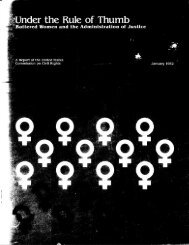In all but a few cases, the parents said they went alongwith their physician's recommendations and would havefollowed the same doctor's advice had his recommendationbeen different.All, and I emphasize all, the doctors we spoke withconfirmed this decisionmaking process. 9Pr<strong>of</strong>essor Turnbull told the Commission,"[P]hysicians set the agenda. The person. . .whohas the ability to set the agenda has to a large degreethe ability to control the outcome." 10In an article in Clinical Pediatrics, Drs. StephenRagatz and Patricia Ellison wrote about their owncase conferences with parents "during which they[the parents] were asked directly to give an indication<strong>of</strong> whether or not they concurred that supportbe withdrawn." 11 Coauthor Dr. Patricia Ellison, apediatric neurologist in private practice in Denverwho also holds an academic appointment, testifiedbefore the Commission. Asked whether her articlesuggested that "there was a preexisting opinion thatsupport be withdrawn and that the parents werethen asked whether they concurred or disagreed,"Dr. Ellison said: "There was not a decision [in any<strong>of</strong> those cases] ever <strong>of</strong>fered by the doctor thatsupport be withdrawn. However, it should be clearthat if the issue is being raised, this is a consideration9Protection <strong>of</strong> Handicapped Newborns: Hearing Before the UnitedStates Commission on Civil Rights 50 (1986) (vol. II) (testimony <strong>of</strong>Carlton Sherwood).10Id. at 58 (testimony <strong>of</strong> Pr<strong>of</strong>. H. Rutherford Turnbull,Department <strong>of</strong> Special Education, <strong>University</strong> <strong>of</strong> Kansas).11Ragatz & Ellison, Decisions to Withdraw Life Support in theNeonatal Intensive Care Unit, 22 Clinical Pediatrics 729, 732(1983). The physicians wrote:We initially assumed that the decision to withdraw supportwas chiefly the [prerogative] <strong>of</strong> the physician, acting inaccordance with the parents' wishes. Decisions were madeafter full discussion with the parents. We subsequentlylearned that parents considered that they had made suchdecisions, and we became more willing to let the parentsmake them, in infants who were considered eligible for sucha decision by the physician. On occasion, quality <strong>of</strong> life issueswere raised by the parents prior to discussion initiated by thephysician.Id at 729-30 (citation omitted) (emphasis added).12Protection <strong>of</strong> Handicapped Newborns: Hearing Before the UnitedStates Commission on Civil Rights 219-20 (1986) (vol. II) (testimony<strong>of</strong> Dr. Patricia Ellison, Research Pr<strong>of</strong>essor, Department <strong>of</strong>Psychology, <strong>University</strong> <strong>of</strong> Denver). Appearing before the Commission,Dr. Ellison characterized as a "misrepresentation," id. at219, the view "that there was a preexisting opinion that supportbe withdrawn and that the parents were then asked whether theyconcurred or disagreed," id. (question by Ms. Hanrahan). Cf. thelanguage in another <strong>of</strong> her articles (Walwork & Ellison, Follow-up<strong>of</strong> Families <strong>of</strong>Neonates in Whom Life Support Was Withdrawn, 24Clinical Pediatrics 14 (1985)):28in the doctor's mind as well. You are not going tohold conferences for those babies about whom thiswould not be an appropriate concern." 12 When shewas asked whether it is usually the parents or thehealth care personnel who initiate the question <strong>of</strong>continuing lifesaving support, she testified thatsometimes it comes from one and sometimes fromthe other, but that when it comes from the parents:[w]e try to respond to the questions and needs <strong>of</strong> theparents, but would never have held a conference wherethis issue <strong>of</strong> support would be set up in the sense <strong>of</strong> adecisionmaking process, unless we as physicians felt thatthis was an appropriate case to do that. We might meetwith the parents and answer questions and say, "Weunderstand your worries, but look, at this time, thingsseem to be. . .[going] this way and this is not a time forsuch a conference." 13Physicians with a bent toward denial <strong>of</strong> treatmentcan be quite insistent in conveying negative information,as they were with the parents <strong>of</strong> Baby JaneDoe: "During her five months in the intensive carenursery, Dan and Linda would see their baby smileand ask hopefully if she were making progress. No,the doctors would respond, she wasn't." 14Physicians had urged Dan and Linda to place Keri-Lynn[Baby Jane Doe] in a home for the severely disabledshortly after birth. Instead, the parents took her home.[F]amilies were told, during the decision-making conference,that the decision would be made by the physician withconsideration <strong>of</strong> the families' wishes and thoughts. . . .Id. at 16.We. . .found that the parents accepted the responsibility forthe decision to withdraw support, even when the pr<strong>of</strong>essionalstaff considered that the decision had been made by thepr<strong>of</strong>essional staff, not by the parents.Id. at 20.In her testimony, Dr. Ellison said, "It should be also well-statedthat with parents who felt that this was really something that wasnot in keeping with their concerns, none <strong>of</strong> the support was everwithdrawn from such a child. We would never have consideredsuch a thing." Protection <strong>of</strong> Handicapped Newborns: Hearing Beforethe United States Commission on Civil Rights 220 (1986) (vol. II)(testimony <strong>of</strong> Dr. Patricia Ellison, Research Pr<strong>of</strong>essor, Department<strong>of</strong> Psychology, <strong>University</strong> <strong>of</strong> Denver.)13Protection <strong>of</strong> Handicapped Newborns: Hearing Before the UnitedStates Commission on Civil Rights 239 (1986) (vol. II) (testimony<strong>of</strong> Dr. Patricia Ellison, Research Pr<strong>of</strong>essor, Department <strong>of</strong>Psychology, <strong>University</strong> <strong>of</strong> Denver). Cf. id. at 267 (testimony <strong>of</strong>Robert R. Williams, Project Analyst, D.C. Association forRetarded Citizens) ("[O]ne wonders why parents with newbornswith severe disabilities are even put in a position <strong>of</strong> having tomake such decisions when they are clearly operating under somuch stress. Physicians <strong>of</strong>ten serve to exacerbate an alreadyhighly charged and tense situation by presenting the parents <strong>of</strong> aninfant with severe disabilities with life and death choices that theywould never, ever consider presenting to parents <strong>of</strong> a nondisabledchild.").14'Adorable' Baby Jane Doe Finally Is Home, MilwaukeeSentinel, May 25, 1984, pt. 1, at 8, col. 1.
"They said she'd only know pain and that she wouldn'trecognize us," Linda said. "If we had placed her in ahome, she would have been like they said. Now, she's outand doing things." 15Although parents may seek to do what they thinkis best for their children, their assessment <strong>of</strong> what isbest depends on the information they have. Nondisabledparents who are suddenly confronted with thebirth <strong>of</strong> a child with a disability are not likely toenter the decisionmaking process with a background<strong>of</strong> adequate and accurate information. AdrienneAsch, who teaches social psychology at the CityCollege <strong>of</strong> New York, testified:[B]ecause parents <strong>of</strong> disabled children, and especiallydisabled newborns, rarely share this minority characteristic[<strong>of</strong> being a person with a disability],. . .they are in anextremely difficult position to advocate for that infant.The parents <strong>of</strong> other children with minority characteristicscan do this much better. They know what life holds instore for that infant and their child. They can advocateagainst those who would hurt their children for thoseminority characteristics, because even though they mayknow that life is fraught with problems, it is also going tocontain various joys.But the parents <strong>of</strong> a disabled infant, moments, days afterits birth, have very little such information. In fact, they arelikely to have been given information by physicians, bysocial workers, by any other pr<strong>of</strong>essionals, by clergy, thatreinforces whatever stereotypes they have about the limitsand deficits and tragedy <strong>of</strong> so-called defective, deformed,damaged infants. 16There seems to be near unanimity, from healthcare personnel who support as well as those whooppose denial <strong>of</strong> treatment, that in all but a handful<strong>of</strong> cases the manner and content <strong>of</strong> the medicalprovider's presentation <strong>of</strong> the issue will be decisivein determining the parental "decision." One nursehas written:Whether and to what extent such children are treatedcan be influenced by physicians and nurses. Suppose, forexample, the staff tells the parents, "It is possible tooperate on your baby and close his back, but his legs willstill be paralyzed and deformed. Most likely he will neverhave bowel or bladder control and will probably develop15Kerr, Baby Doe's Success^/] Progress Defying Prognosis, Newsday,Dec. 7, 1987, at 2, 23.16Protection <strong>of</strong> Handicapped Newborns: Hearing Before the UnitedStates Commission on Civil Rights 125-26 (1986) (vol. II) (testimony<strong>of</strong> Adrienne Asch, Adjunct Lecturer in Social Psychology,City College <strong>of</strong> New York). See also id. at 141 (testimony <strong>of</strong> MaryJane Owen, Director, Disability Focus, Inc.) ("Unfortunately,handicapped infants are born into alien families, families that havehydrocephalus, which may require many operations withpossible complications. Or, we can do nothing and allowhim to die." Would you be surprised if the parents optedfor death?On the other hand, a positive attitude can go a long wayin persuading parents to accept their baby. This has beenthe stance <strong>of</strong> our nursing staff. We encourage parents totouch, hold, feed, talk to, and play with their infant. Wetell them to bring in music boxes, toys, and, later, evenclothes. By focusing on the normal things the baby does,we foster a positive image <strong>of</strong> the child. For example, wemight say, "Look how strongly he sucks" and "See howtightly she holds your finger." We try to emphasize thattheir baby does things all babies do. 17One <strong>of</strong> the lead physicians involved in the selectivetreatment program at Children's Hospital <strong>of</strong>Oklahoma, 18 Dr. Richard Gross, has said: "I think ittakes a great deal <strong>of</strong> courage on the. . .[part] <strong>of</strong>parents to say, in the face <strong>of</strong> a recommendation froma physician, that they wish to go counter to that.They certainly do not have the background at thetime the child is born to really know what isexpected." 19 Dr. Mildred Stahlman was even moredirect:I can persuade 99 percent <strong>of</strong> parents to my way <strong>of</strong> thinkingif I really work at it, even if I am 100 percent wrong. If Itell them in such a way that I appear concerned and that Iam knowledgeable and that I have their interest at heartand the interest <strong>of</strong> their. . .newborn baby, there is noquestion in my mind but that they will let me "cut <strong>of</strong>f thatinfant's head." 20From a treatment perspective opposite to that <strong>of</strong> Dr.Gross, Dr. David McLone testified concerning hisexperience with parents <strong>of</strong> children with spinabifida:I have now treated about 300 newborns and had thismidnight discussion with about 300 families, and I havenot had one family, once fully informed <strong>of</strong> the availabilityand the likely outcome <strong>of</strong> treatment, who has refused tohave the back repaired at the time <strong>of</strong> birth.In my experience in the cases I am familiar with wherethe decision was made not to close the back, that decision,in essence, was made by the physician and by what he toldalready probably stated the only requirement they have <strong>of</strong> a childwas that it must be perfect. . . .").17Homer, Selective Treatment, 84 Am. J. Nursing 309, 309-10(1984).18See chap. 1 and text accompanying notes 7-15.19Take Two: Who Lives, Who Dies?—Part II (Cable NewsNetwork, Feb. 22, 1984), (Radio-TV Monitoring Service, Inc.,Transcript at 5).20Quoted in Patrick, Little Murders, 10 New Times 32, 36 (1978).29
- Page 1 and 2: MedicalDiscriminationAgainstChildre
- Page 3 and 4: idments • Section 504 • Medical
- Page 5: LETTER OF TRANSMITTALThe PresidentT
- Page 9 and 10: CONTENTSExecutive Summary 11. Funda
- Page 11: 12. The Performance of the Federal
- Page 14 and 15: • The role of economic considerat
- Page 16 and 17: disabilities at the time that the c
- Page 19 and 20: generated by health care personnel
- Page 21: ing how they would obtain medical r
- Page 24 and 25: The Commission sees several advanta
- Page 26 and 27: acquiescence in the death or elimin
- Page 28 and 29: Services of the Department of Healt
- Page 30 and 31: Chapter 1Fundamental Rights: An Int
- Page 32 and 33: Carlton Johnson was evaluated by a
- Page 34 and 35: "that Mr. and Mrs. Doe, after havin
- Page 36 and 37: American Coalition of Citizens with
- Page 38 and 39: Chapter 2The Physician-Parent Relat
- Page 42 and 43: the family, and the family went alo
- Page 44 and 45: Chapter 3The Role of Quality of Lif
- Page 47: transition from education to employ
- Page 50 and 51: tion programs can become productive
- Page 52 and 53: unsuccessful efforts of a private a
- Page 54 and 55: [S]ince I have been at Children's M
- Page 56 and 57: Another survey by Siperstein, Wolra
- Page 58 and 59: of life with a child who is disable
- Page 60 and 61: Chapter 4The Role of Economic Consi
- Page 62 and 63: ©TABLE 4.1Pediatricians' Responses
- Page 64 and 65: • The differences in average cost
- Page 66 and 67: FIGURE 4.1Comparative Costs of Inst
- Page 68 and 69: Chapter 5State LawWhat is the law g
- Page 70 and 71: Like all authority. . .parental aut
- Page 72 and 73: This decision, however, was promptl
- Page 74 and 75: No otherwise qualified handicapped
- Page 76 and 77: Bloomington's Infant Doe in April 1
- Page 78 and 79: ONONTABLE 6.1Physician's assessment
- Page 80 and 81: Essentially, HHS interpreted the su
- Page 82 and 83: Final 504 RuleHHS received nearly 1
- Page 84 and 85: lifesaving operations to close her
- Page 86 and 87: any further implementation of the F
- Page 88 and 89: handicapped infants might violate S
- Page 90 and 91:
the provision does cover discrimina
- Page 92 and 93:
of the infants. The review mechanis
- Page 94 and 95:
Under the law, the Department of He
- Page 96 and 97:
that "the phrase 'or holds the reas
- Page 98 and 99:
allows an infant to be denied nutri
- Page 100 and 101:
avoid the explicit standards set fo
- Page 102 and 103:
(as opposed to the far) future, the
- Page 104 and 105:
It was recognized, therefore, that
- Page 106 and 107:
als with the particular disability
- Page 108 and 109:
cared for. They are thus different,
- Page 110 and 111:
medical advice. Given the magnitude
- Page 112 and 113:
tions at all regarding the subject
- Page 114 and 115:
strates that there is a grave dange
- Page 116 and 117:
Disincentives to Whistle BlowingDen
- Page 118 and 119:
Using a cumulative scaling procedur
- Page 120 and 121:
Of that 300 we targeted, approximat
- Page 122 and 123:
Conclusionphysicians set forth in t
- Page 124 and 125:
taking place when a report of suspe
- Page 126 and 127:
where the parents say "the child fe
- Page 128 and 129:
Nevertheless, the organization oppo
- Page 130 and 131:
Chapter 11The Role and Performance
- Page 132 and 133:
a member of the American Academy of
- Page 134 and 135:
possibilities that "will be most li
- Page 136 and 137:
clearly indicate that the committee
- Page 138 and 139:
Reviewing the first 30 months of th
- Page 140 and 141:
Webster's defines "suspected" as "t
- Page 142 and 143:
Chapter 12The Performance of the Fe
- Page 144 and 145:
The baby's doctor, E. Laurence Hode
- Page 146 and 147:
to achieve a reasonable life". . .w
- Page 148 and 149:
an unmarried mother receiving welfa
- Page 150 and 151:
can be sure all appropriate actions
- Page 152 and 153:
inquiries to determine whether they
- Page 154 and 155:
Chapter 13The Protection and Advoca
- Page 156 and 157:
authority to conduct retrospective
- Page 158 and 159:
facility that uses such a committee
- Page 160 and 161:
Chapter 14Findings and Recommendati
- Page 162 and 163:
as the coordination and development
- Page 164 and 165:
in the advisory process who is conc
- Page 166 and 167:
A Dissenting View on the Report Med
- Page 168 and 169:
arts) to depend upon knowledge of h
- Page 170 and 171:
Attachments to Statement of William
- Page 172 and 173:
medical facility. Considerations su
- Page 174 and 175:
Fund for the Improvement of Postsec
- Page 176 and 177:
eports such as Kopelman et al. demo
- Page 178 and 179:
Appendix 1EXPOSING OUR CHILDREN, EX
- Page 180 and 181:
abilities or functions, they are de
- Page 182 and 183:
My principal reason for objecting t
- Page 184 and 185:
I derive this hint from the many co
- Page 186 and 187:
moral distinction. A girl is a huma
- Page 188 and 189:
Appendix 2SURVEY OFSTATE BABY DOE P
- Page 190 and 191:
insure the immediate referral of po
- Page 192 and 193:
Hospital Liaisons Designated in Mos
- Page 194 and 195:
BABY DOE COMPARED WITH REGULAR CPS
- Page 196 and 197:
We also asked state CPS offices wha
- Page 198 and 199:
Limited information was available o
- Page 200 and 201:
one-quarter felt that baby doe case
- Page 202 and 203:
Appendix 3INFANT CARE REVIEW COMMIT
- Page 204 and 205:
and guidelines concerning the withh
- Page 206 and 207:
treated to assure the prompt ^repor
- Page 208 and 209:
3. Educating Staff and FamiliesThre
- Page 210 and 211:
One of the 10 ethics committees vis
- Page 212 and 213:
asphyxiation during the birth proce
- Page 214 and 215:
Prospective Review -- Each committe
- Page 216 and 217:
OBSERVATIONSThe inspection found th
- Page 218 and 219:
May 1, 1989Page 2The Commission adv
- Page 220 and 221:
Doe 1 admitted on the record of the
- Page 222 and 223:
tion is the basis for failure to tr
- Page 224:
her (much appreciated) vote for thi


